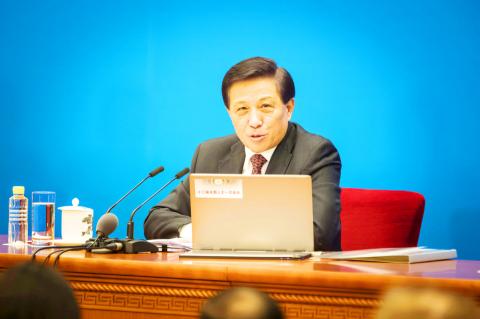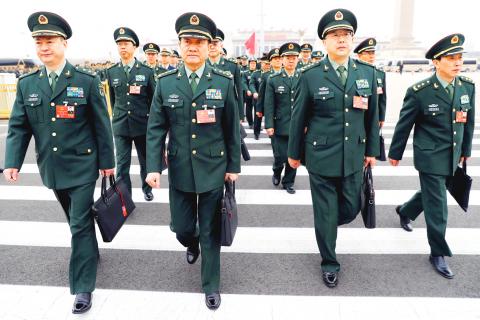China has no desire to overturn the existing international order and its increasingly powerful military does not constitute a threat to others, Chinese Vice Minister of Foreign Affairs and National People’s Congress (NPC) spokesman Zhang Yesui (張業遂) said yesterday.
In a break with recent practice, Zhang refused to provide a figure for the rate of growth in the national defense budget.
However, he sought to strike a reassuring tone in remarks at a news conference on the eve of the congress’ annual session.

Photo: Bloomberg
He said China defended and contributed to the UN-centered global order, but also said some reforms were necessary.
“China’s development is conducive to world peace, stability and prosperity,” he said, pointing to global economic growth, trade and poverty reduction.
“As to the international order, we have no intention of overthrowing everything for starting over again,” Zhang said.

Photo: Reuters
Reforms should focus on “international rules that have fallen behind the times and no longer align with the shared aspirations of all nations,” he said.
China’s secretive military had begun to open up a crack in recent years, and the NPC spokesman has made a tradition of responding to a question on the defense budget by announcing the percentage increase over the past years, at least in rough terms.
Zhang did not address the question of numbers, saying instead that past increases by a “modest margin” had gone to equipment upgrades, training and improving welfare and living conditions for troops.
China’s defense spending as a share of GDP and the budget also remains lower than that of other major nations, he said.
“China proceeds from a defense policy that is defensive in nature. China’s development will not pose a threat to other countries,” Zhang said.
The Chinese Ministry of Finance last year said the defense budget would top 1 trillion yuan (US$145 billion) after the exact figure was initially kept out of documents released at the start of the annual legislative sessions.
However, China’s publicly announced defense spending has never been accurate since it omits a significant amount of “off-book” expenditures on defense equipment projects, said Peter Jennings, executive director of the Australian Strategic Policy Institute in Canberra.
“What’s alarming is not the non-reporting of largely fictitious defense spending figures so much as the Chinese leadership is shedding even the pretense of being open about its military plans,’’ Jennings said in an e-mail.
Combined with Chinese President Xi Jinping’s (習近平) plans to eliminate term limits on his rule and his consolidation of control over the military, the lack of public information about defense spending and military planning “pushes China toward a more authoritarian and militarized leadership,” Jennings said.
“These trends should be deeply concerning to the Asia-Pacific region and beyond,” he said.

The US government has signed defense cooperation agreements with Japan and the Philippines to boost the deterrence capabilities of countries in the first island chain, a report by the National Security Bureau (NSB) showed. The main countries on the first island chain include the two nations and Taiwan. The bureau is to present the report at a meeting of the legislature’s Foreign Affairs and National Defense Committee tomorrow. The US military has deployed Typhon missile systems to Japan’s Yamaguchi Prefecture and Zambales province in the Philippines during their joint military exercises. It has also installed NMESIS anti-ship systems in Japan’s Okinawa

‘WIN-WIN’: The Philippines, and central and eastern European countries are important potential drone cooperation partners, Minister of Foreign Affairs Lin Chia-lung said Minister of Foreign Affairs Lin Chia-lung (林佳龍) in an interview published yesterday confirmed that there are joint ventures between Taiwan and Poland in the drone industry. Lin made the remark in an exclusive interview with the Chinese-language Liberty Times (the Taipei Times’ sister paper). The government-backed Taiwan Excellence Drone International Business Opportunities Alliance and the Polish Chamber of Unmanned Systems on Wednesday last week signed a memorandum of understanding in Poland to develop a “non-China” supply chain for drones and work together on key technologies. Asked if Taiwan prioritized Poland among central and eastern European countries in drone collaboration, Lin

The Chien Feng IV (勁蜂, Mighty Hornet) loitering munition is on track to enter flight tests next month in connection with potential adoption by Taiwanese and US armed forces, a government source said yesterday. The kamikaze drone, which boasts a range of 1,000km, debuted at the Taipei Aerospace and Defense Technology Exhibition in September, the official said on condition of anonymity. The Chungshan Institute of Science and Technology and US-based Kratos Defense jointly developed the platform by leveraging the engine and airframe of the latter’s MQM-178 Firejet target drone, they said. The uncrewed aerial vehicle is designed to utilize an artificial intelligence computer

Renewed border fighting between Thailand and Cambodia showed no signs of abating yesterday, leaving hundreds of thousands of displaced people in both countries living in strained conditions as more flooded into temporary shelters. Reporters on the Thai side of the border heard sounds of outgoing, indirect fire yesterday. About 400,000 people have been evacuated from affected areas in Thailand and about 700 schools closed while fighting was ongoing in four border provinces, said Thai Rear Admiral Surasant Kongsiri, a spokesman for the military. Cambodia evacuated more than 127,000 villagers and closed hundreds of schools, the Thai Ministry of Defense said. Thailand’s military announced that